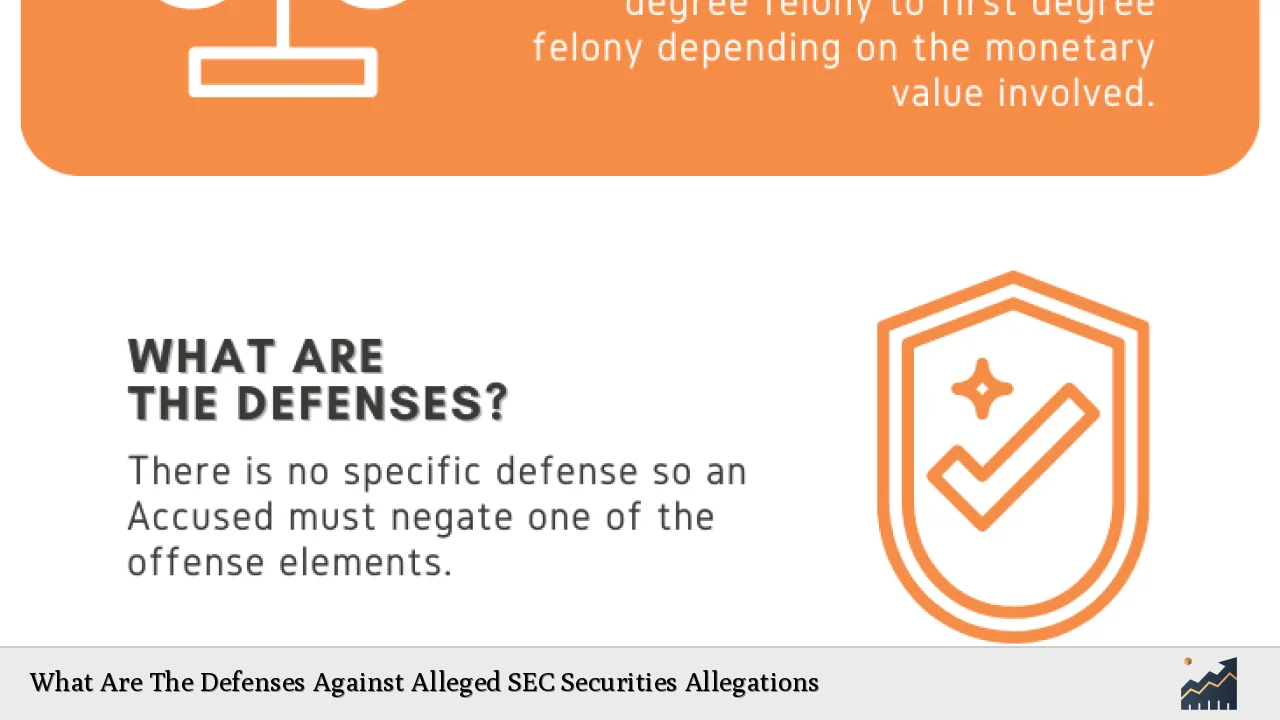The landscape of securities regulation is complex, and allegations from the Securities and Exchange Commission (SEC) can pose significant risks to individuals and companies alike. Defending against these allegations requires a robust understanding of the legal framework, potential defenses, and strategic implementation of these defenses. This article delves into the various defenses available against alleged SEC securities violations, providing insights into market trends, regulatory aspects, and future outlooks.
| Key Concept | Description/Impact |
|---|---|
| Insider Trading | Defendants can argue lack of material nonpublic information or demonstrate independent research to counter claims. |
| Financial Fraud | Defenses may include proving compliance with regulations or demonstrating that the alleged misrepresentations were not material. |
| Misleading Disclosures | Defendants can assert that their statements were accurate or that they provided adequate context for investors. |
| Regulatory Non-Compliance | Demonstrating efforts to comply with SEC regulations can mitigate penalties. |
| Scienter Defenses | Defendants can argue the absence of intent to deceive or knowledge of wrongdoing. |
Market Analysis and Trends
The SEC has intensified its scrutiny of securities practices, particularly in light of recent market volatility and technological advancements in trading. The rise of digital assets and cryptocurrency has prompted the SEC to adapt its enforcement strategies. In 2023, for instance, the SEC pursued actions against several cryptocurrency platforms for non-compliance with securities laws. This trend indicates a broader regulatory focus on ensuring transparency and protecting investors in emerging markets.
Current Market Statistics
- SEC Enforcement Actions: In 2023 alone, the SEC initiated over 800 enforcement actions, a notable increase from previous years.
- Market Volatility: The S&P 500 experienced fluctuations of over 20% within the year, highlighting the need for stringent regulatory oversight.
- Digital Asset Regulation: Approximately 50% of enforcement actions related to digital assets reflect the SEC’s commitment to adapting regulations to new market realities.
Implementation Strategies
To effectively defend against SEC allegations, it is essential to implement comprehensive strategies tailored to specific cases. Here are key strategies:
- Early Legal Representation: Engaging an experienced SEC defense attorney at the onset of an investigation can significantly influence outcomes.
- Document Management: Properly managing communications and documentation is crucial. Accurate responses to subpoenas can prevent self-incrimination.
- Evidence Assessment: A thorough review of evidence allows for identifying weaknesses in the SEC’s case, potentially leading to favorable settlements.
- Negotiation Skills: Skilled negotiation can resolve issues without formal charges, minimizing reputational damage.
Risk Considerations
Investors and companies must be aware of various risks associated with SEC allegations:
- Reputational Damage: Even unproven allegations can lead to significant reputational harm.
- Financial Penalties: The SEC can impose substantial fines which may affect financial stability.
- Operational Disruptions: Investigations can divert resources and focus from core business operations.
Regulatory Aspects
Understanding the regulatory framework is vital for developing effective defenses. The SEC operates under several key provisions:
- Securities Act of 1933: This act requires registration of securities offerings unless an exemption applies.
- Securities Exchange Act of 1934: This act governs secondary trading and mandates periodic disclosures by publicly traded companies.
- Enforcement Mechanisms: The SEC uses both civil actions in federal court and administrative proceedings to enforce compliance.
Common Enforcement Outcomes
| Punishment | Description | Likely Forum | Purpose |
|---|---|---|---|
| Bans and Suspensions | Bar or suspend individuals from working in securities if serious violations occur | SEC Administrative Courts | Prevent further violations |
| Civil Fines | Monetary penalties imposed on violators | Federal Court | Deter future violations |
Future Outlook
The future landscape for defending against SEC allegations will likely be shaped by ongoing developments in technology and market practices. As markets evolve, so too will regulatory frameworks:
- Increased Scrutiny on Digital Assets: Expect more rigorous enforcement actions as regulators seek to clarify rules surrounding cryptocurrencies.
- Evolving Compliance Standards: Companies will need to adapt quickly to changing compliance requirements as new regulations are introduced.
- Focus on Transparency: Enhanced transparency requirements will likely emerge as regulators aim to protect investors more effectively.
Frequently Asked Questions About Defenses Against Alleged SEC Securities Allegations
- What are common defenses against insider trading allegations?
Common defenses include demonstrating lack of material nonpublic information or showing that trades were based on independent research. - How can companies mitigate risks associated with SEC investigations?
Companies should engage legal counsel early, maintain thorough documentation, and ensure compliance with all regulatory requirements. - What is the role of an SEC defense attorney?
An SEC defense attorney helps clients navigate investigations, develop defense strategies, negotiate settlements, and represent them in proceedings. - What penalties can the SEC impose?
The SEC can impose civil fines, bans from industry participation, and initiate lawsuits for recovery on behalf of harmed investors. - How does the SEC enforce securities laws?
The SEC enforces laws through civil actions in federal courts and administrative proceedings conducted by administrative law judges. - What should individuals do if they receive a subpoena from the SEC?
Individuals should consult with an experienced attorney immediately to understand their rights and obligations. - Are there any defenses specific to financial fraud allegations?
Defendants may argue compliance with applicable regulations or demonstrate that alleged misrepresentations were not material. - What trends are shaping future SEC enforcement actions?
The rise of digital assets and increasing market volatility are leading to heightened scrutiny and evolving regulatory responses.
In conclusion, defending against alleged SEC securities violations requires a multifaceted approach that includes understanding legal frameworks, implementing strategic defenses, and staying informed about market trends. As regulations continue to evolve, staying proactive in compliance efforts will be essential for mitigating risks associated with potential allegations.

